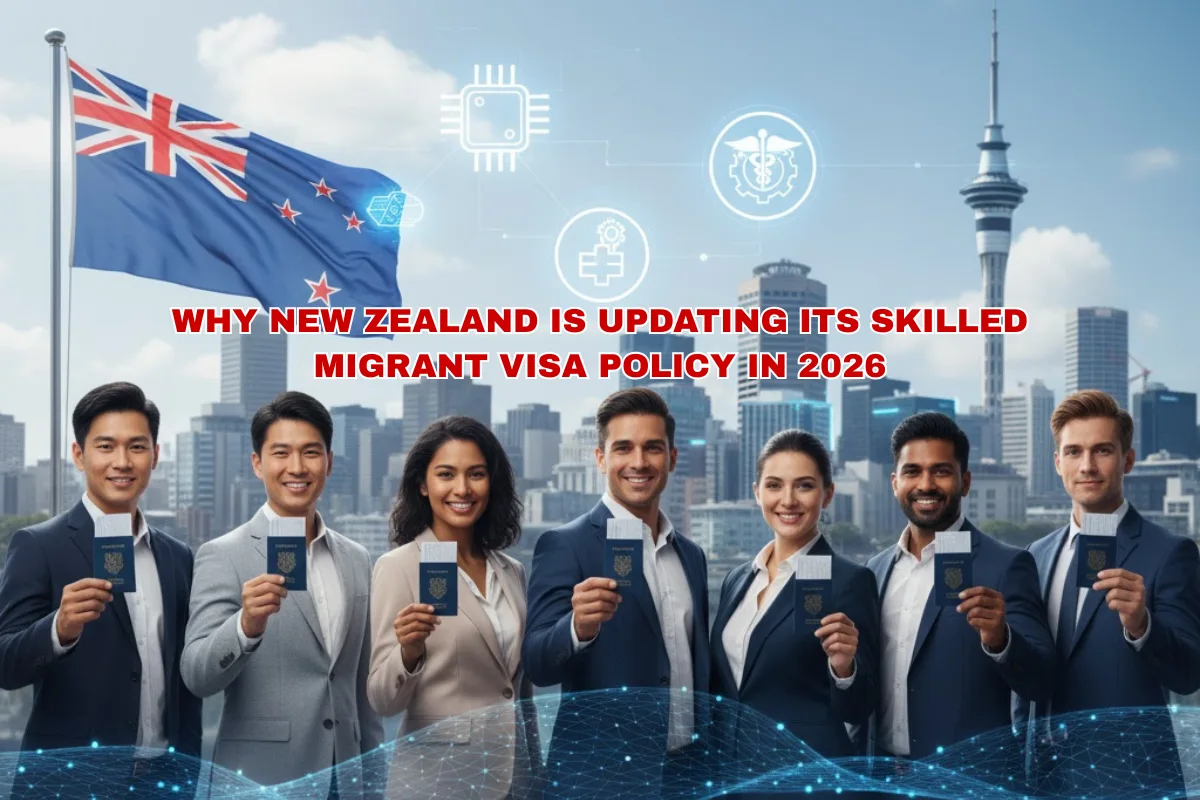
Why New Zealand Is Updating Its Skilled Migrant Visa Policy in 2026
Table of Contents
New Zealand is changing its Skilled Migrant rules to match the country’s job needs better, keep people already working there, and make the immigration system clearer and fairer. These changes aim to help employers find the right staff and give migrants clearer, faster routes to residence.
What is changing — a simple summary
From August 2026, New Zealand will introduce major updates to the Skilled Migrant Category (commonly called the Skilled Migrant Visa) system. The new design introduces two main residence pathways — one aimed at degree-level skilled workers and the other aimed at trades and technicians. The rules around how much New Zealand work experience counts, and how wages and qualifications are treated, will also be updated.
Why these changes are happening
- To fill real job gaps. Many businesses in New Zealand need workers in certain areas. The government wants a visa system that brings people with those exact skills. This helps companies grow and keeps essential services running.
- To keep people already here. Employers have trained and relied on staff who are already living and working in New Zealand. The new rules make it easier for these people to move from a work visa to residency, so employers don’t lose valuable workers.
- To value local study and experience. New Zealand qualifications and local work experience will get clearer recognition under the new settings. That helps people who studied or trained in New Zealand to stay and build a life there.
- To make the system simpler and faster. By setting clearer pathways and requirements, the government hopes immigration decisions will be easier to understand and quicker to process. That benefits both employers and job-seekers.
The main points you should know
- Two new pathways: One pathway will be for skilled roles (ANZSCO skill levels 1–3) with relevant experience and required wages. The second pathway will be for trades and technicians who have the right qualifications and pay. These pathways are meant to cover both white-collar and hands-on skilled jobs.
- Work experience rules: The amount and type of work experience that counts have been updated so that more relevant time is recognised — especially New Zealand experience. In some cases the maximum NZ work time that counts has been reduced, which helps some applicants qualify sooner.
- Wages and skill levels: Wage thresholds and how wages count toward being “skilled” have been revised. The government wants to make sure people in essential roles who earn market wages are included. Note: median wage levels and related requirements can change, so always check the official pages before you apply.
- Recognition of NZ qualifications: If you studied in New Zealand, your degree or diploma will generally carry clearer value under the new system. This gives international graduates a fairer chance to translate study into work and residence.
Who benefits and who should be careful
People likely to benefit
- Workers already in New Zealand in shortage areas who meet the experience and wage rules.
- Tradespeople and technicians with recognised qualifications.
- Graduates from New Zealand institutions who stay and work after study.
People who should be cautious
- People applying from overseas without a job offer: the new rules still prioritise roles that meet market needs.
- Applicants who expect every requirement to disappear — important checks like health, character, and minimum experience or wage may still apply.
Practical steps you can take right now
- Read the official pages. Start with the Immigration New Zealand pages about the Skilled Migrant Category and about NZeTA for visitors. If you plan a short trip first, you can Submit NZeTA Online and check official NZeTA Visa Information pages to understand visitor rules versus residence rules.
- Gather documents early. Keep payslips, employment letters, qualification certificates, police checks and passport pages organised. Good records speed up any immigration process.
- Talk to your employer. Employers who want to keep staff should be ready to support residency applications — for example by providing job descriptions and evidence of salary.
- Check salary/median wage updates. The median wage requirement can change; check the Skilled Migrant EOI and visa pages before you apply.
- Consider professional advice. If your case is complex, an immigration adviser can help explain the right pathway and required evidence.
Common questions — short answers
Q: Will the new rules make it easy for everyone to get residence?
A: No. The changes make clearer routes for people whose skills and wages match New Zealand’s needs, but applicants still need to meet health, character, and work or wage requirements.
Q: Can I apply from outside New Zealand?
A: Some people may apply from overseas if they meet criteria, but the system gives priority to people with jobs or New Zealand work experience.
Q: When do the rules start?
A: The changes are scheduled to take effect in August 2026. Watch Immigration New Zealand for detailed criteria and any transitional rules.
A human note — why this matters
If you’re thinking of moving, working, or staying in New Zealand, these changes show the country wants skilled people who will help itself and their local communities. The new system is more focused on real job needs and on people who are already adding value in New Zealand. Planning ahead, keeping good records, and talking with employers will make the process smoother.